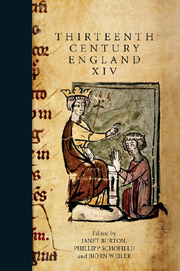Book contents
- Frontmatter
- Contents
- List of Figures and Tables
- Preface
- List of Contributors
- List of Abbreviations
- Politics and the People in Thirteenth-Century England
- Peasants, Litigation and Agency in Medieval England: the Development of Law in Manorial Courts in the late Thirteenth and Early Fourteenth Centuries
- Medieval Accounting Memoranda from Norwich Cathedral Priory
- The Seals of London's Governing Elite in the Thirteenth Century
- The Marriages of the English Earls in the Thirteenth Century: a Social Perspective
- Monks and Politics in Thirteenth-Century Wales and Catalonia
- Lope Fernández, Bishop of Morocco: His Diplomatic Role in the Planning of an Anglo-Castilian Crusade into Northern Africa
- On Kingship and Tyranny: Grosseteste's Memorandum and its Place in the Baronial Reform Movement
- St Edmund of Canterbury and Henry III in the Shadow of Thomas Becket
- Matthew Paris and the Royal Christmas: Ritualised Communication in Text and Practice
- Thomas of Lancaster in the Vita Edwardi Secundi: a Study in Disillusionment
- John and Henry III in the Anglo-Norman Prose Brut
- Genealogiae orbiculatae: Matthew Paris and the Invention of Visual Abstracts of English History
- The Genealogical Chronicles of Matthew Paris: Edition
Politics and the People in Thirteenth-Century England
Published online by Cambridge University Press: 05 May 2013
- Frontmatter
- Contents
- List of Figures and Tables
- Preface
- List of Contributors
- List of Abbreviations
- Politics and the People in Thirteenth-Century England
- Peasants, Litigation and Agency in Medieval England: the Development of Law in Manorial Courts in the late Thirteenth and Early Fourteenth Centuries
- Medieval Accounting Memoranda from Norwich Cathedral Priory
- The Seals of London's Governing Elite in the Thirteenth Century
- The Marriages of the English Earls in the Thirteenth Century: a Social Perspective
- Monks and Politics in Thirteenth-Century Wales and Catalonia
- Lope Fernández, Bishop of Morocco: His Diplomatic Role in the Planning of an Anglo-Castilian Crusade into Northern Africa
- On Kingship and Tyranny: Grosseteste's Memorandum and its Place in the Baronial Reform Movement
- St Edmund of Canterbury and Henry III in the Shadow of Thomas Becket
- Matthew Paris and the Royal Christmas: Ritualised Communication in Text and Practice
- Thomas of Lancaster in the Vita Edwardi Secundi: a Study in Disillusionment
- John and Henry III in the Anglo-Norman Prose Brut
- Genealogiae orbiculatae: Matthew Paris and the Invention of Visual Abstracts of English History
- The Genealogical Chronicles of Matthew Paris: Edition
Summary
Amorphous though they may seem, ‘the people’ of our title are easy enough to define. They comprised the peasants of the countryside, both free and villein, and most of those living in the towns, below the level of the loose oligarchies which generally controlled town government: in other words, the great bulk of the population, excluding the governing elite of churchmen, nobles and the knightly class. In what follows we shall ask, and try to answer, a series of questions about this large and socially disparate group. How familiar were its members with national affairs and national politics? How was political information transmitted to them and disseminated by them? Why did kings seek to inform them about their policies and to demand their support? And what was the particular importance of the thirteenth century in these processes?
This formidable agenda might start with a single more limited and less portentous question. Would most English people, say, in 1250, have known who the king was? The answer, which we might at first be inclined to reject, is almost certainly ‘yes’. The majority of the king's subjects would by that date have had in their purses the new ‘long cross’ pennies of Henry III, with the king titled ‘Rex Henricus’ and identified by his crown and in some cases by his sceptre as well; and it is striking that historians of the central Middle Ages, unlike their Anglo-Saxon counterparts, have made so little of the coinage as a means of communication and an expression of royal authority.
- Type
- Chapter
- Information
- Thirteenth Century England XIVProceedings of the Aberystwyth and Lampeter Conference, 2011, pp. 1 - 14Publisher: Boydell & BrewerPrint publication year: 2013



